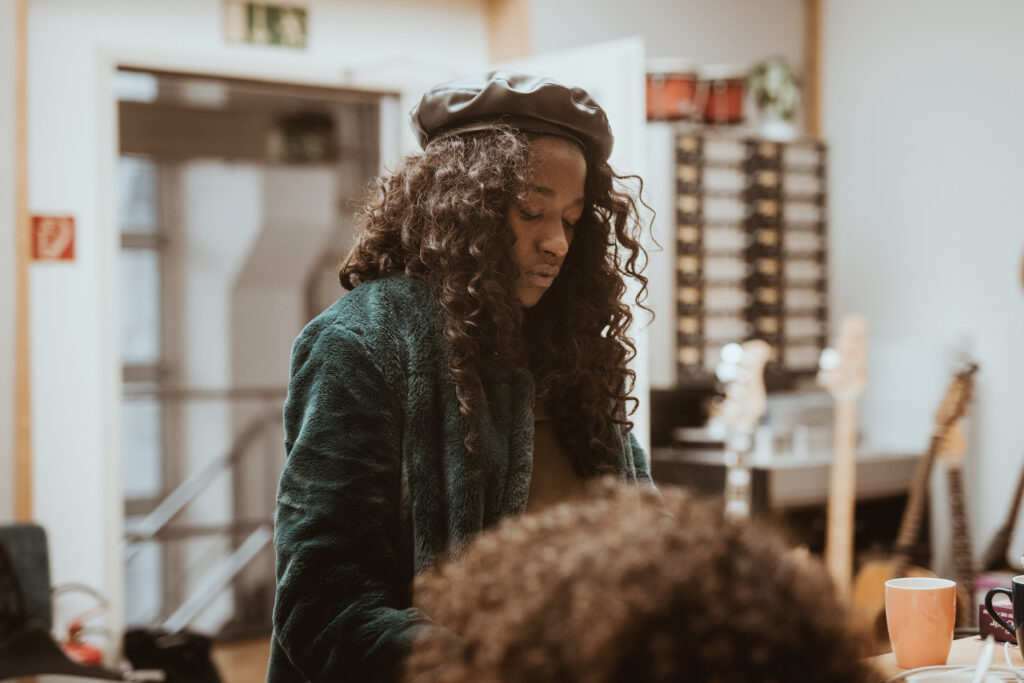

(Cologne, Germany)
All the artists in this project come from different music scenes. How was the experience, your point of view, of the process, giving the project your personal character and working with the personal characteristics of each artist?
The project was very exciting for me because on the one hand, we are from different countries and on the other hand, because we didn’t come together, we each just got beats and parts from the other artists. That was definitely a very new experience. But I always find it very interesting to do a feature song. The other artist has already written his part, which gives the song a direction and I just follow that. It’s always an adventure. I also find the beats very different, which was probably also due to the fact that so many different artists came together. The variety was fun. I’m thrilled with all the artists that were chosen, the project has become a masterpiece.
What did you learn from working with the musicians from Cuba that you would like to integrate into your future work?
I learned a lot from the collaboration. I learned to try out very different styles in a relatively short time. I think I succeeded quite well and it was definitely a lot of fun and that’s the main thing. I was also very happy about the parts that came from Cuba. I also felt the urge to rap in Spanish. I think that I will try to bring other languages into my songs more often because I just find that refreshing. I like the German language, but I think it’s complicated when you want to make music. If you sing or rap in Spanish, in English, or in a completely different language, Swahili for example, it has a completely different sound, a completely different vibe and I really liked that about the parts that came from Cuba.
You also rapped a little bit in Spanish, didn’t you?
I said a single sentence in Spanish. I would have liked to do more, but I’m not ready for that yet, but maybe one day.
In this project, many languages come together, German, English, Spanish, but the only common means of communication is music. If you look at it from that point of view, how was the communication within the team?
I have to say, the communication went very easily. Well, it wasn’t really complicated, because we only had contact through the Internet. But because each artist knew what they were doing and kind of felt the other artist through the music, there weren’t a lot of questions, it was like, okay we got the part, we’re going to keep working on it, it was like okay, nice, I’m feeling this and then I’m going to go right at it.
What has been the biggest challenge in working over the web/internet/cell phones?
I think the biggest challenge when you communicate over the internet is, you’re not next to each other, you can’t really exchange ideas. After all, you might be talking on the phone and then the connection breaks down – die Verbindung bricht ab – haha. It’s just different when you stand in front of each other, see each other and also get the real reaction from the other person, how does he react to your piece, your part. And you can also help each other even more when you’re together. But definitely, I even might have had the idea to do something in Spanish, if we had sat together in a room and worked together on the songs. Unfortunately, we didn’t, but maybe that will come in the future.
What would you say to the audience what they can expect from the project Dimelo Rapeando?
The project Dimela Rapeando – Die Verbindung bricht ab is a very exciting project, as I said, we are different artists; we are different, linguistically and we have very different styles. I think we created something very special because not every song on the EP sounds the same, no every song is really different. We have something danceable in it, it’s still thought-provoking, it’s forward, it’s cool, it’s straight, it has fire. But there’s also a track that’s very laid back in terms of the beat I think, and like I said the styles are also completely different. We have dancehall, we have hip-hop, rap, like really old school, we just have everything. You can expect a lot. I can only say, be curious!
What are the disadvantages and advantages of online collaboration for you?
The disadvantages of online collaboration are definitely that you’re not facing each other. You just can’t exchange ideas like you can when you’re sitting next to each other. It is not possible to show the other person your part or to rap with each other somehow. It’s also a pity that you just send your part away and then something comes back but you never really know what might come back from the other artist. That’s also exciting, but as I said, when you’re writing a song, it can also just be an advantage if you do it together because then you can really work on the song together, but also on the individual parts. Maybe there would have been common parts, like not that one person just does the first part and the other the second, or the first and the hook. If your are working together in the same room you can write a part together, or go into conversations within the parts. On the other hand, by being so far apart, you have more freedom as an artist to just work on the songs. There isn’t anybody who might have another idea, it’s like okay, you’re there, your idea counts. And I think because we are so far away from each other, you don’t even realize in the process that you have just made a song with an artist from a completely different world – an EP even.
What additional experience were you able to gain through this collaboration and in what way do you plan to use this experience for future projects?
I definitely plan to travel to Cuba. Funnily enough, it’s always been my dream to travel to Cuba and this project came pretty handy, it just fits. I hope we can visit the artists in Cuba and somehow do something together again. I definitely want to travel and just exchange ideas with more artists and make music. You also learn a lot about other flows. I think that everyone, every language has its own flow, its own vibe. I think that even if you don’t speak the language, you can learn a lot and take a lot with you for your own art.
Because of the pandemic, we can only use the internet and social media to promote our work. What are your experiences with social media before the pandemic and now during it, to promote your music, your projects? Was that difficult for you to deal with?
I have to say that before the pandemic, of course, there was already a lot going on on Instagram, but now during the pandemic, people are definitely looking at it more. I also think that a lot of people kind of miss live music and look for it on Instagram when there are musicians going live and playing live music. I have to say that it depends on everyone how much they want to do on Instagram, but I think that Instagram is a very good platform for us artists to spread our art. And I think it’s important if you want to generate more reach, to post continuously, to show yourself, to represent your music, to go live more often. I have to say that I don’t manage that very well, but I’m working on it and I know many people who say that this is also a very special time, we haven’t always had these opportunities. But today everyone can promote themselves on Instagram. I also believe you should not think too much about posts, that happened to me and then I do not post at all – just do it and you will get something good in return. I actually should post a lot more. Today I posted more than I usually do, but I should keep that frequency every day. But the thing is, there’s not always something to post, and you don’t have to post everything, but even then you can still pick and choose what you post and if you really want to, you can always find something. Therefore, it is just all excuses.
Did you have to adapt your work during this time of the pandemic and if so what changed?
For me, not much really changed during the pandemic. I work at a school twice a week, I give music classes there and at the moment schools are closed. So we’ve recently started online teaching, which is something new, but then again it only takes me 4 hours a week. Other than that I have a lot of time and am busy with my music. Therefore, not so much has changed. Well, we can’t go to parties right now, that’s a bit of a pity. But now that summer is coming, we can go to the park and meet people again, exchange ideas, get new ideas, hear new stories, and also tell new stories with your music again. But no, not much has changed.
Is there anything else you would like to say in regards to the project, or is there a topic that we haven’t touched upon?
Well, I had a lot of fun participating in the project. The team is really a very nice one and I would be very happy to be part of a project like this again and I would definitely support it. Thank you also for the support on your part, thank you for choosing me, I am honored.

(c) Jannis Danikas
Biography
“[…] Born in Mombasa and raised in Cologne, Leila Akinyi experiences the diversity of different cultures from the beginning, but also has to face racist experiences. Her lyrics pick up on these personal experiences, among others. She sings in German and Swahili, mixes soul, rap, reggae and Afrobeats again and again to a new fire of sound and writes songs that move and touch. In her first EP release 2016 Afro Spartana on the label Melting Pot Music, the Cologne-based singer and rapper raps in her eponymous song with bitterly witty language, denouncing the prejudices and clichés about black people. Leila Akinyi stands for “being strong” and empowerment! She stands for “being black” and for “spreading love” – loving yourself and others – regardless of what someone is or looks like. We are looking forward to a great songwriter without fear of taboos, an artist with an impressive voice and clear attitude, who promotes empathy and the “right to be different”.
Text: Goethe Institut https://www.goethe.de/ins/fr/de/spr/eng/pas/pro/21435535.html
